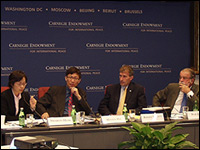IMGXYZ817IMGZYXThe China Program at Carnegie Endowment hosted a seminar on October 11, 2007 entitled: "China's Olympian Challenge: Can Beijing Deliver on its Promises?" The seminar consisted of two panels that both focus on the latest progress in Beijing's preparation for the Olympic Game next year. Panel 1 featured Sharon Hom, Executive Director of Human Rights in China, Randy Wilber, Senior Sport Physiologist of U.S. Olympic Committee, and Bob Diez, Asia Program Coordinator of the Committee to Protect Journalist. Director of China Program Minxin Pei moderated the first panel. Speakers for Panel 2 included Jill Savitt, Director of Dream for Darfur, Sean Woo, General Counsel in the Office of Senator Sam Brownback, and Jeffrey Bader, Director of the John L. Thornton China Center at Brookings Institution. This second panel was moderated by Carnegie visiting scholar Joshua Kurlantzick.
Each speaker in Panel 1 evaluated the most recent development in Beijing's preparation for the Olympics from three distinct perspectives: human rights, environment, and freedom of press. Sharon Hom painted a sobering picture of the status of human rights in China. She pointed out that as the game approaches, China has in fact increasingly flex its muscles on information control, surveillance, censorship, and crackdown against media and press freedom. Meanwhile, corruption and the lack of transparency within government continue to hinder China from becoming a competent host country. Bob Diez from the Committee to Protect Journalist agreed to most of Hom's comments regarding journalist freedom in China, and supplemented with specific names of dissident journalists who have been arrested by the Chinese government in the past few month. Dr. Wiber from the U.S. Olympic Committee offered a rather depressing assessment on the environment condition in China during next year's game. With detailed statistic analysis and charts, Dr. Wiber illustrated that Beijing in summer 2008 would be even less environmental friendly for the athletes than Mexico City and Los Angeles of 1984.
IMGXYZ818IMGZYXPanel 2 emphasized on how China can use Olympic as a window of opportunity for greater opening, democratization, political reforms, and greater integration into the international community. Jill Savitt from Dream for Darfur believed that the international community should use Olympic 2008 as leverage against China's persistent support of Sudanese government's policy in Darfur. Sean Woo had no doubt that China would experience major changes after it hosts the 2008 Olympic game. The Congress will monitor closely on how China would handle those changes. Jeffrey Bader of the Brookings Institution first reminded the audience that human rights record does not have to be the prerequisite for becoming a competent host of Olympic; in retrospective, even the United States itself had public image problem when Los Angeles hosted the 1984 Olympics. The fact is, no nation, including China, is going to revise its core interests and its assessment of its core national interests just because of the Olympics. Nevertheless, Bader is confident that the Chinese leadership fully understands the importance of Olympic in helping China to project a positive image for the world as a successful, open and tolerant nation.
This event summary was prepared by Wayne Chen, Junior Fellow in the China Program
